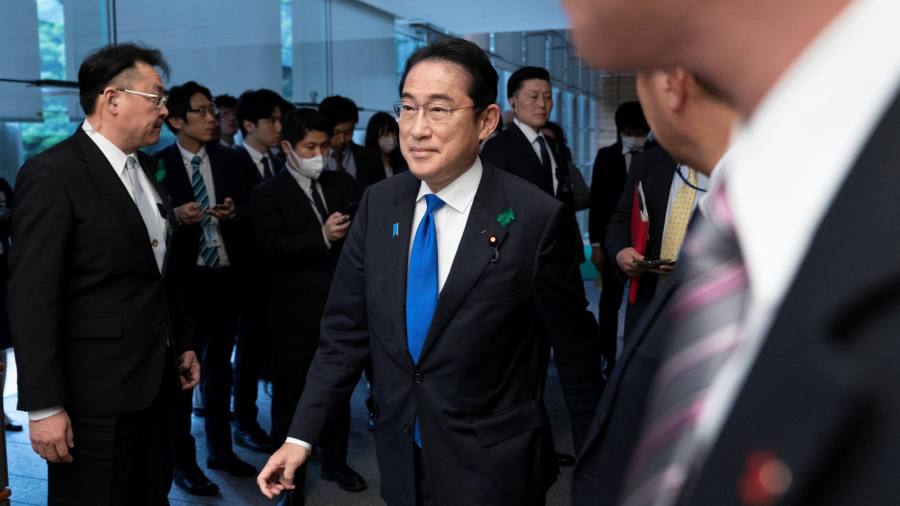For more than six months, Japanese prime minister Fumio Kishida had struggled to find a decisive policy victory to reverse his sinking popularity.
Yet as his Liberal Democratic party prepares for a big electoral test this weekend, the 65-year-old premier, who narrowly escaped a recent bomb attack, received a welcome bounce from two unlikely sources: Ukraine and baseball.
Polls by state broadcaster NHK and other major media outlets in the wake of Kishida’s visit to Ukraine last month have shown a rapid rise in approval for his administration after his popularity had fallen to dangerously low levels following the assassination of former prime minister Shinzo Abe last year.
When Kishida took power in late 2021, analysts had forecast that Japan would return to an era of revolving premiers in the shadow of Abe, the country’s longest-serving prime minister and most consequential statesman in decades.
But a flurry of high-profile foreign diplomacy and security policy moves have elevated the formerly unassuming Kishida, raising the prospect of a snap general election this year that could see him stay on past the end of his term as party leader in 2024.
For months, Kishida’s aides had meticulously planned a surprise March 21 meeting with Ukraine’s president Volodymyr Zelenskyy, which was revealed after the Japanese prime minister was caught on TV boarding a train from Poland to Kyiv.
Two people close to the Japanese government said Kishida’s trip — which was the last among G7 leaders and coincided with Chinese president Xi Jinping’s visit to Moscow — was likely to have played a role in Xi cancelling a call with Zelenskyy, even as Beijing has tried to act as a potential peacemaker.
Foreign policy gains historically have not provided a meaningful popularity boost for Japanese leaders, but analysts said luck may also have intervened in Kishida’s case.
The visit to Kyiv was alerted to the public on television just minutes before Japan beat Mexico in the semi-final of the World Baseball Classic, as emotions were running high. Japan went on beat the US in the final and win the tournament undefeated.
A Nikkei poll conducted days after Kishida’s Ukraine visit showed his approval rating had risen five percentage points from the previous month, to 48 per cent, from a low of 35 per cent in December. Seventy-one per cent of those surveyed said they approved of the trip.
“In terms of domestic policy, there is no wow element,” said Takao Toshikawa, editor-in-chief of the political newsletter Insideline. “In a rare case, his approval figure bounced on foreign policy and security issues and now a rising trend is almost certain.”
The positive momentum is expected to lift the ruling LDP’s performance in five by-elections that will be held across Japan this weekend.
The lower house by-elections in Yamaguchi prefecture will be to fill vacancies left by Abe, who was slain by a gunman last July, and his brother Nobuo Kishi, a former defence minister who retired this year, citing health reasons.
The LDP is expected to claim those districts, while attention has turned to its prospects for seats in Chiba and Wakayama, as well as one upper house by-election in Oita prefecture.

Toshikawa forecast the LDP would win at least three of the five seats in contention, and if the outcome favoured Kishida’s position, the prime minister could call a snap election in September to further solidify his gains. Kishida’s term as head of the LDP runs until September 2024.
The prime minister has lent his support to ruling party candidates on the campaign trail, despite his flagging approval rating. Last Saturday, within an hour of escaping a bomb attack at the port of Saikazaki in Wakayama, Kishida returned to a rally. “This is an important election for the country and we must see it to the end,” Kishida said.
He has also made bold moves on the international stage, surprising the US and other allies by promptly ending Tokyo’s decade-long courtship of Moscow after Russia’s invasion of Ukraine, pushing through a significant rise in defence spending and rebuilding ties with South Korea.
The administration hopes to capitalise on Kishida’s foreign policy record by successfully chairing the G7 summit in his hometown of Hiroshima in May.
Still, analysts pointed to Kishida’s lacklustre domestic economic programme as a weakness for his administration. His pet policy of “unprecedented” childcare reform to boost Japan’s declining birthrate has failed to win public backing, with many households expressing concern that the promise of expanded cash handouts and other benefits will lead to future tax rises.
Details of the government’s childcare package are expected to be finalised in the coming months, but it remains uncertain whether Kishida will follow through on a pledge to double the childcare budget from the current 2 per cent of gross domestic product.
Makiko Nakamuro, professor at Keio University, said the government tended to focus on short-term measures such as cash handouts, especially before elections. Such incentives fail to address long-term challenges that disincentivise couples from having children, such as the high costs of private education.
“It’s good that the Kishida administration has positioned childcare at the centre of its policy challenge,” said Nakamuro. “But it’s hard to see how cash handouts would provide an incentive to have another child. It would be better if the government could make unprecedented investments to raise the quality of public education.”
Read the full article here




